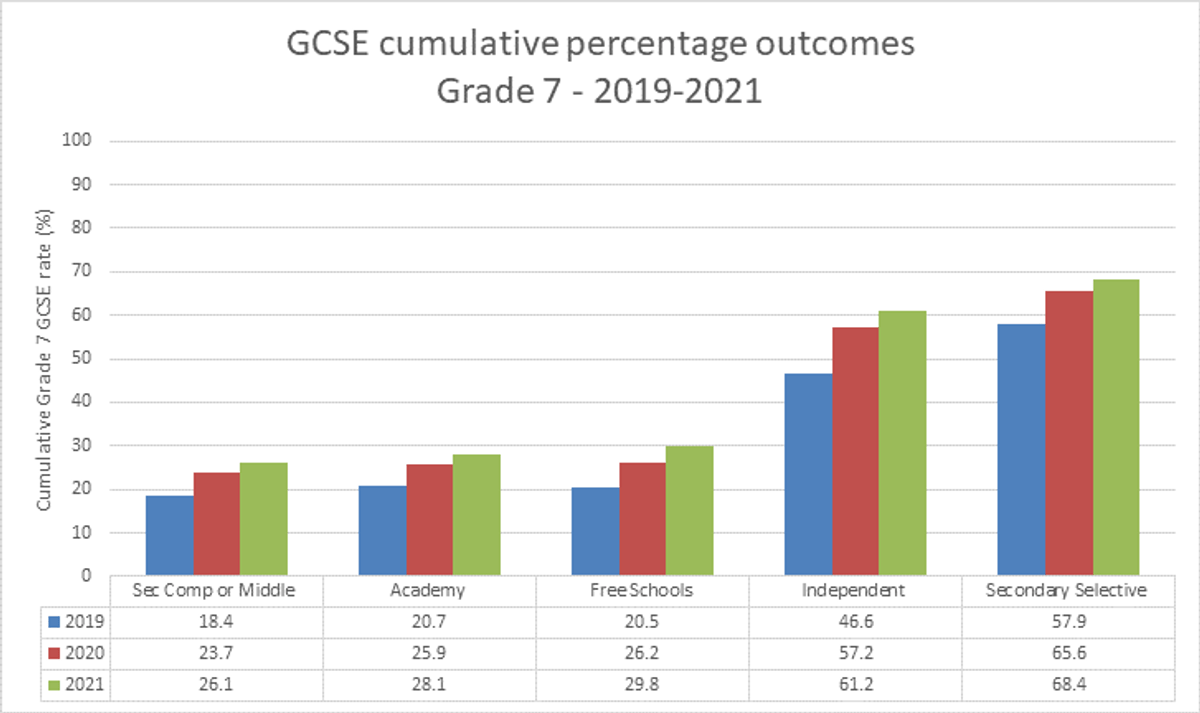It’s exam time and in a dusty school hall, students sit at rows of desks, a GCSE paper face down in front of them. A headteacher watches on. When they turn over the paper, apart from a list of instructions and questions, what do they see?
The student sees a knowledge test, maybe a daunting one, possibly a step towards their future education and career.
But to the Head, those GCSEs may look very different. They might see a test of whether or not their school’s and teachers’ hard work has paid off.
And in Whitehall and Westminster, the combined outcome of hundreds of thousands of exams could impact policy and even political careers.

Vase or Face?
In this way, GCSEs are much like the Rubin’s Vase optical illusion. At first glance you see either two faces or a vase, before realising you can actually see both.
GCSEs - showing what a student can do
The most obvious face of GCSEs is measuring student attainment.
GCSEs assess learning levels, certify achievement, and ensure reliability and comparability across different institutions - state and independent schools or FE colleges. They are the students’ passport to progression.
Only one in three pupils stay on at the school where they sat their GCSEs. The others wave the awards at college admissions officers and employers to show what they’ve achieved.
Without the widely trusted measure, a student could face a barrage of re-tests with each job or college application they make – as used to happen when there were no GCSEs and no national standards at 16.
The awards are proof of competence levels in which academic and workplace recruiters can have confidence.
GCSEs as an accountability tool
On the other side of Rubin’s Vase is the GCSE’s second face, an accountability framework.
The awards data is vital for parents or pupils choosing a school, sixth form or FE College.
It shows how well individual institutions perform for their students. It’s a means to track the achievers or stragglers, allows targeted support and holds school leaders to account.
Comparing GCSE awards data against the KS3 baseline figures reveals not only the achievements of the 16-year-olds but also how they’ve done against expectations – i.e. their ‘progress’ a key measure of an institution’s accomplishments.
Thanks to the assessment’s uniformity and ability to give granular insight into achievement by pupil characteristic and school or college type, politicians, academics and policymakers also use GCSE data to spot trends at macro and micro levels.
Policy changes are informed by it and the impact of educational or social interventions can be measured by it.
A good example of this is in the data gathered over three years covering the pandemic when exams were suspended.
GCSEs exams are known for their ability to level the playing field. Whether a student was dropped off at school in a Bentley or a bus, in the exam hall they all face the same paper with the same equipment.
When GCSEs were replaced with Teacher Assessed Grades and Centre Assessment Grades in 2020 and 2021, the ‘attainment gap’ between independent and non-selective state schools increased.
And grades achieved in schools with selective intakes grew at faster than their non-selective peers.
The reasons for this increase are not clear. Some argue that lockdown allowed the most academically-able students were free to do more independent study.
Data shows that proportion achieving the highest grades in Independent schools from 2019 to 2021 expanded at almost double the rate of those in Secondary Comprehensive and Middle.
At the same time the attainment gap between the two extended 7 percentage points.
What these statistics seem to reveal is that when exams were suspended the playing field did not appear so level .
Of course it is always valid to debate the role and future of GCSEs, and we welcome that debate, but any discussion should be informed by the knowledge of what this multi-faceted assessment brings to the table, and a clear plan to fill the void if it were to go.
Read More By This Author:
- GCSE Maths and Numeracy: They don’t equal the same | AQi powered by AQA
- Assessment reform – don’t assume what young people will think | AQi powered by AQA
- How Hard is it to Learn Soft Skills? | AQi powered by AQA
Read More On This Subject:










